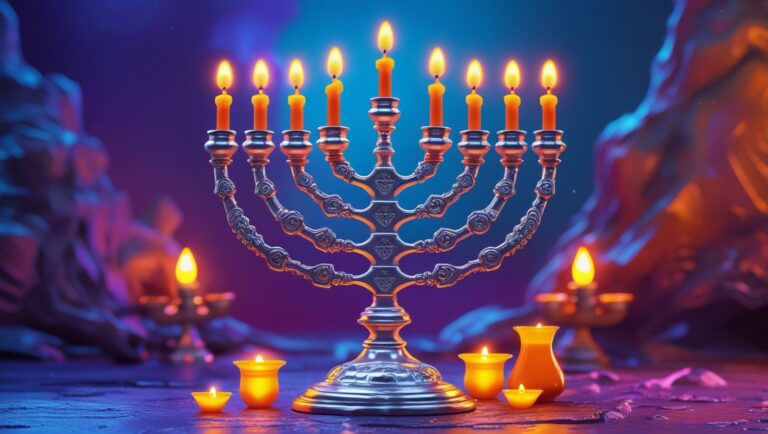Many people are looking for the definitive solution to their parnassa that will finally make their lives easier
It’s hard to think of a more elusive topic as parnassa. Many people turn to segulot such as saying parashat haman and tefillah for parnassa several times, doing Perek Shira 40 days, or anything else, when it could that the “magic blocks” are somewhere else.
However, the aspiration for wealth, free from financial worries, is as much a spiritual desire as a physical one. Rebbe Nachman, in his teachings from Likutey Moharan, asserts that great wealth is essential for the attainment of “depth of Torah”.
The logic is straightforward: immersing oneself in the mysteries of Torah requires a mind unburdened by material concerns, including the necessity for parnassa. He cites examples of illustrious figures such as Moshe Rabbenu, Eliyahu HaNavi, and Rabbi Yehuda HaNasi, among others, who were incredibly rich.
Of course, the secrets of Torah are not attained via some magic beard, or purple mystic mushrooms, but rather through conscious awareness, deep study and fixing our Middot (character traits). But this will be a subject for another time.
Another aspect to consider is that material resources, being blessings, can contribute significantly to one’s inner peace and enhance their ability to serve Hashem more effectively. The Jewish sages highlight an interesting perspective: in the Olam HaNeshamot (world of souls), during the judgment, individuals will be questioned for not fully embracing life’s joys.
This suggests that Hashem’s intention is for us to enjoy worldly pleasures, acknowledging His benevolence at every level (of course, not to be overly indulgent in them).
However, it’s imperative to balance this enjoyment, aligning it with Avodat Hashem, as a means to draw closer to Him. Indulging in worldly pleasures solely for self-gratification is universally acknowledged as detrimental, potentially leading one down a destructive path. This is known to anyone with a modicum of a sekhel (intellect).
The Baal Shem Tov underscores this point in Tzava’at HaRiVash, emphasizing the importance of positive intention in enjoyment, while at the same time implying one should contemplate how much more delightful Hashem would be to these experiences.
The Kabbalah on the month of Shvat
Asher, one of the twelve sons of Yaakov Avinu, was bestowed with a distinct and abundant blessing for prosperity and abundance. His name, Asher (אשר), itself signifies happiness and wealth, stemming from the root word osher (אושר).
True to his name, Asher’s inheritance in Eretz Yisrael was exceptionally fertile, yielding the finest crops among all the tribes. A Midrash by our sages elaborates that this blessing extended beyond mere parnassa, bestowing upon the women of the tribe of Asher remarkable beauty and allure.
In Kabbalistic tradition, the tribe of Asher is aligned with the month of Shevat (the month of this article), the period when the New Year of Trees is celebrated on the 14th of Shevat. Rabbi Tzadok haCohen of Lublin, in Pri Tzadik, interprets a verse from the Torah stating “As for Asher, his produce [should be] fat (rich, delicious),” as an indication of Asher’s intrinsic connection to the enjoyment of food.
Furthermore, Moshe Rabbenu, in his final blessings, accorded special favor to the tribe of Asher, praying that they be “blessed above other sons, esteemed by his brothers, and that he may bathe his feet in olive oil.” This blessing underlines a life of luxury and esteem for the tribe of Asher.
Sparks of Judgment
The intricacies of decision-making in Heaven are profoundly complex. I am in no way suggesting “doing x will necessarily cause y” because we are all bound by a multitude of factors, and sometimes the blessings that we “unlock” are caused by other factors. This is why I prefer to think in relative terms of “x potentially causes (or positively influences) y”.
Understanding Divine Providence poses a significant challenge, yet Hashem, in His wisdom, occasionally reveals insights into what actions might curry His favor, thereby influencing our destinies.
As explored in previous articles, Hashem administers His Creation through two fundamental forces;
- The first is Chassadim, or lovingkindness
- The second is a combination of Gevurot (Strengths), also called Dinim (Judgments)
These forces, though seemingly contradictory, are crucial in their synergy. They create a delicate equilibrium between pleasure and pain, reward and punishment, all the while preserving the sanctity of our free will. This balance is key to the ongoing functioning and harmony of the universe as ordained by Hashem.
Chassadim are essentially the pleasure we receive, be it parnassa, health, children, spouse, shalom bayt and so on. We see this as a positive force that expands our mind and makes life sweet. Who wouldn’t want more of that?
Yet, too much of a thing is seldom good. That’s why we have the Gevurot which prevent the free-flow of light to our lives and guarantees our free will and very existence. Why, if we would be showered with endless light of Chassadim, that would defeat the whole purpose of Creation as we wouldn’t be encouraged to improve our Avodat Hashem and fix our Middot (character traits). Too much Gevurot however, would break us completely and not allow life to progress.
Lifting the Sparks
When Adam HaRishon ate from the Tree of Knowledge of Good and Evil, certain spiritual sparks fell in the lower spiritual realms.
There are 288 the radiant sparks that descend from Atzilut to provide nourishment to the shattered vessels that fell from Atzilut to Beriyah, Yetzirah, and Asiya. During the time of tikun (rectification), Hashem took the majority of these fragmented vessels along with the light of the 288 sparks and raised them back to Atzilut.
Since then, our primary spiritual mission has been to continue the process that Hashem initiated, completing the ascent of these sparks and fragments of the vessels. This uplifting process is referred to as M”N (Mey Nukvin, the feminine waters), which generates unity and ushers in new illumination.
It’s important not to take these terms literally and explaining them would take too long. But essentially these sparks exist in every facet of Creation, but basically the sparks need to be lifted back to their source in the higher Partzufim. Think of it as making the Tikkun (rectifying) of a huge spiritual engine which needs to have its parts back in order to function properly.
I know it’s a lot to take in, but we are going to come full circle: the suffering we go through in life (including parnassa suffering) is by necessity a consequence of the sparks related to your spiritual system not being lifted back to their source.
Hitbodedut and lifting the Sparks of Judgment
In Tava’at HaRivash, it is recorded that the Ba’al Shem Tov considered the practice of Hitbodedut – a form of personal, intimate prayer – as akin to experiencing Ruach HaKodesh (Divine Spirit). This stems from its origin in a state of Dvekut (deep connection) with Hashem. Hitbodedut not only enhances self-awareness but also brings about a profound sense of calm, similar to the relief one might feel in expressing inner thoughts to a psychologist.
The primary goal of Hitbodedut is to cultivate a mental, more than a physical, state of seclusion, guiding an individual towards genuine Teshuva (repentance). This form of Teshuva involves intimately connecting with Hashem, thus enabling the elevation of one’s fallen sparks back to their source. These sparks often encompass internal judgments that hinder our spiritual rectification. As mentioned, this also includes problems with parnassa.
The Midrash Rabba (Devarim 5:5) offers a compelling insight: “when Judgment (din) is executed below, it is not needed above; conversely, when Judgment is neglected below, it is enacted above.” In a simple sense, this relates to the Sanhedrin and judicial systems, which are expected to uphold justice as per Torah teachings. When they succeed, peace prevails, and Divine intervention is unnecessary. However, when human justice fails or is corrupted, Divine intervention becomes inevitable, often manifesting as calamities.
Rebbe Nachman of Breslov extends this principle to the individual level: Self-judgment can preclude the need for Divine judgment, thereby reducing personal suffering. Conversely, failing to self-reflect can invite Divine judgment.
Thus, Hitbodedut emerges as a powerful tool for self-elevation and mitigating judgments, aligning with Hashem’s expectations of us. Starting with just five minutes a day and gradually increasing, this practice can transform one into a true Mara D’Chushbena (master of self-accounting), as described in the Zohar.
To summarize, doing Hitbodedut and bringing our failings to light lifts up the spiritual sparks that are preventing us from getting what we need. And, yes, we have to be honest and take responsibility to account for our failings.
Are you eating the food or is the food eating you?
The act of eating offers profound insights into our spiritual status and is also related to Parnassa. As our sages teach, parnassah comes to the world through the holy Table which housed the Lekhem HaPanim (“bread of countenance”). Today we don’t have the Holy Temple, but the spiritual counterpart (of the holy table) is very much in place.
Mastering our approach to food is challenging; often, we simply relax and enjoy the meal. However, as elucidated by Chassidic masters such as the Ba’al Shem Tov, the Noam Elimelech, and Rebbe Nachman of Breslov, there exists a significant spiritual practice in the act of eating.
The teachings of the Arizal reveal that eating is, in essence, the physical manifestation of prayer and blessings. It’s a process through which we channel the spiritual energy acquired from higher realms into our physical world.
Rabbi Chaim Vital, in Sha’ar Ruach HaKodesh (“Gate of the Holy Spirit”), relays his master’s instruction that for one to attain Ruach HaKodesh (“Holy Spirit”), immense focus on blessings related to enjoyment (like those for food and drink) is crucial and is “one of the most important practices for its attainment.
Contrary to the expectation that fasting or intense prayer might be the primary pathways to achieving Ruach HaKodesh, it is remarkable that Hashem has ordained that sincere blessings of enjoyment hold significant importance.
These blessings serve a dual purpose: they express gratitude to Hashem and facilitate the transfer of spiritual abundance into our lives, while simultaneously purifying the food from spiritual impurities, thus cleansing our souls in a natural process. In other words: they lift the sparks contained in the food, especially the Birkat HaMazon, and bring shefa to the Partzufim of the higher and lower worlds.
This is parnassa in a very simple sense. The partzufim that we bring light to also channel abundance down to us from the spiritual realms to the physical realm.
As mentioned above, the name Asher (אשר) is also invoked to channel Mochin (divine consciousness) from the Sephira of Binah (understanding) during blessings “asher (אשר) kidshnanu b’mitzvotav…”. In our times, lacking the Altar for sacrifices, our dining tables serve a similar role in effecting atonement. This is parallel to the holy table in the Temple as mentioned above.
One method of increasing parnassa is through the hospitality of sharing meals with others. Additionally, as taught by Rebbe Nachman, eating in a dignified, regal manner reflects the Sephira of Malkhut (Kingship), attracting even greater parnassa.
Either the food lifts us up or it drags us down depending on our awareness.
Thus, the critical question is: are we consuming the food or if the food is consuming us?
The Yichud for Parnassah
We all know we are supposed to have concentration on the Pasuk (verse) “Poteach Et Yadecha Umasbiah L’Chol Chai Ratzon” (trans.: Open your hand and satiate all living beings with your will) from the Ashrei Tehila 145.
The reason is that this Pasuk has many deep Kabbalistic secrets of Parnassa and an Yichud (unification) which can be made for those who know.
I won’t be explaining it here but those who can read and understand can copy and perform them when saying this Pasuk during the Tefilah or meditate at home.
Those who wish to study and learn more about it are welcome to schedule a consultation.
Final remarks
We’ve seen how parnassa, far from being a mere worldly pursuit, holds a special place in spiritual growth. Rebbe Nachman’s insights remind us that a worry-free mind, unburdened by material concerns, is a fertile ground for deep Torah study (i.e. the Kabbalistic secrets).
The humble act of eating is also transformed into a divine service through the wisdom of the Chassidic masters. Who would have thought that the blessings we recite over food could be our ticket to spiritual elevation? It’s almost like finding hidden treasure in our daily bread!
In essence, these teachings invite us to embrace a life where spiritual and material pursuits aren’t at odds but are interwoven strands of Avodat Hashem. So, as we navigate our daily routines, let’s remember to infuse them with intention, gratitude, and a touch of divine consciousness. Whether we’re savoring a meal or appreciating our blessings, every moment holds the potential for spiritual growth and coming close to Hashem. See this article for more info.
While all these things are not sure-fire ways of guaranteeing parnassa (as nothing is), they still point us in that direction.
Here’s to living a life rich in both material and spiritual parnassa!







